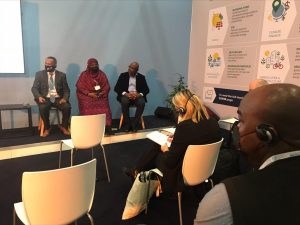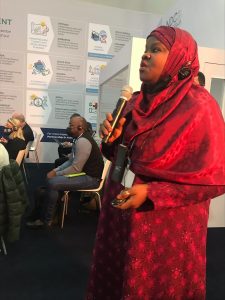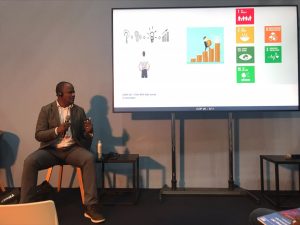 Glasgow, November 4, 2021 – The Agence Francaise de Developpement (AFD), the Global Green Growth Institute (GGGI), and IDDRI held a joint side event at the NDC Partnership Pavilion at COP26, inviting representatives from Burkina Faso, Ethiopia, Mozambique, and Nigeria to share experiences and lessons from the development of Long Term Visions and Strategies for Low-Emission and Climate Resilient Development, often referred to as LT-LEDS or LTS.
Glasgow, November 4, 2021 – The Agence Francaise de Developpement (AFD), the Global Green Growth Institute (GGGI), and IDDRI held a joint side event at the NDC Partnership Pavilion at COP26, inviting representatives from Burkina Faso, Ethiopia, Mozambique, and Nigeria to share experiences and lessons from the development of Long Term Visions and Strategies for Low-Emission and Climate Resilient Development, often referred to as LT-LEDS or LTS.
The LT-LEDS are important instruments to stake course towards net-zero by mid-century and achievement of the Paris Agreement goals of keeping global warming below 2 degrees and closer to 1.5 degrees compared to pre-industrial levels. Submission of LT-LEDS is encouraged under the Paris Agreement, and while 33 countries have already submitted, more than 100 countries are currently in process of preparing their long-term strategies as a compass for more ambitious Nationally Determined Contributions (NDCs).
“Countries in Africa could benefit through the development of their Long Term – low emission and climate-resilient development Strategies by aligning National development priorities with low emission targets, raising the adaptation policy agenda, tapping into climate finance, enhancing local capacity and demonstrating global climate leadership,” shared Dr. Stelios Grafakos, Principal Economist, Climate Action and Inclusive Development (CAID), GGGI.
 GGGI and AFD are supporting the Governments of Ethiopia and Burkina Faso to develop their LT-LEDS. GGGI Ethiopia LEDS coordinator Mr. Gebru Jember Endalew presented the approaches emphasizing the importance of national ownership of the LT-LEDS development process and the implementation plans and processes that must follow the development of the strategies. “LEDS must be followed by elaborated Roadmaps for implementation with sufficient financing”, Mr. Jember said adding that the “fly in and fly out” approach describing the use of international consultants in the articulation of NDCs and climate targets has proven not effective in ensuring that the strategies and their objectives are owned by national governments and institutions. A central element of LT-LEDS development must be on capacity building and engagement across ministries and sectors at different levels to achieve a whole-of-economy and whole-of-society participation.
GGGI and AFD are supporting the Governments of Ethiopia and Burkina Faso to develop their LT-LEDS. GGGI Ethiopia LEDS coordinator Mr. Gebru Jember Endalew presented the approaches emphasizing the importance of national ownership of the LT-LEDS development process and the implementation plans and processes that must follow the development of the strategies. “LEDS must be followed by elaborated Roadmaps for implementation with sufficient financing”, Mr. Jember said adding that the “fly in and fly out” approach describing the use of international consultants in the articulation of NDCs and climate targets has proven not effective in ensuring that the strategies and their objectives are owned by national governments and institutions. A central element of LT-LEDS development must be on capacity building and engagement across ministries and sectors at different levels to achieve a whole-of-economy and whole-of-society participation.
This was further supported by Ethiopia’s Commissioner for Environment, Forest, and Climate Change, Professor Fedaku Beyene who emphasized the importance of LEDS in moving beyond a project approach towards more holistic and transformational solutions across the different sectors in line with the county’s 2050 Vision. Professor Fedaku confirmed the commitment of the Ethiopian government to reach net-zero emissions by 2050 and highlighted the ongoing work between government ministries’ focal points and GGGI experts in all relevant LT-LEDS sectors.
 Burkina Faso representative, Mr. Combassere Nebnoma Alain also highlighted the innovative approaches applied by the Government supported by GGGI and AFD to raise awareness and build capacity across different sectors and ministries. Burkina Faso has emphasized the importance of applying models that are tailored to and suitable for the national context in order to ensure that LT-LEDS can be followed by effective climate action while enhancing National ownership.
Burkina Faso representative, Mr. Combassere Nebnoma Alain also highlighted the innovative approaches applied by the Government supported by GGGI and AFD to raise awareness and build capacity across different sectors and ministries. Burkina Faso has emphasized the importance of applying models that are tailored to and suitable for the national context in order to ensure that LT-LEDS can be followed by effective climate action while enhancing National ownership.
Access to data was highlighted as a challenge across the different country experiences. Halima Bawa-Awari, Director of Department of Climate Change Nigeria, emphasized the importance of the National Statistics Agency as part of the LEDS Steering Committee, while Prof Fedaku Beyene emphasized the need for coordinated governance structures between federal and regional levels across different sectors also to ensure collection of required quality information and data. He also highlighted the importance of strengthening MRV systems for transparency and the collection of good quality data, particularly in the AFOLU sectors.
Focus on socio-economic co-benefits, particularly in terms of livelihoods and green jobs was emphasized by Mr. Aristides Muhate of Mozambique Ministry of Agriculture and Rural Development, whose LEDS has applied models for long-term AFOLU Pathways. Similarly, Ethiopia, Burkina Faso, and Nigeria LEDS place great emphasis on the alignment with SDGs, future economic growth, and poverty eradication. Lastly, all panelists emphasized the importance of capacity enhancement and engagement with National experts and Government officers not only in the process of developing the strategy but particularly during the modeling work of countries’ low carbon emission pathways.
The event was moderated by Ms. Marta Torres Gunfaus of IDDRI.